vocabulary on weather and climate
vocabulary积累概要

ints中文英文备注欧盟(又称“欧洲共同体”)下的机构:创始成员国有6个,分别为法国、德国、意大利、荷兰、比利时和卢森堡。
该联盟现拥有28个会员国(西班牙、瑞典、英国、法国、德国、卢森堡、希腊、意大利、荷兰、奥地利、比利时、保加利亚、塞浦路斯、克罗地亚、捷克、丹麦、爱沙尼亚Estonia、芬兰、爱尔兰、匈牙利、拉脱维亚Latvia、立陶宛Lithuania、马耳他、波兰、葡萄牙、罗马尼亚、斯洛文尼亚、斯洛伐克)。
1. European Parliament 欧洲议会(欧盟立法机构,负责欧盟立法、监督、预算);EU主要决2. Council of the EU,欧盟理事会(欧盟各成员国部长组成,日常决策,拥有欧盟立法权);策机构3. European Commission,欧盟委员会(欧盟的执行机构);European Council,欧洲理事会(欧盟首脑会议,欧盟最高决策机构);注:Council of Europe,欧洲委员会,不是欧盟机构。
成立于1949年5月5日,现有33个成员。
outline/brief出席会议的有XXX,XXX…The conference was high in level,receiving the attendance of XXX,XXX…Present at the Conference were XXX, XXX …Be presented at…Also paying tribute to Mr. Ashe were….发表致辞address the conference会上还有XX也做了演讲The launch event was also addressed byxxx, xxx, xxx, among others.就…简单讲述He was briefed on….结束/高潮culminate……meeting culminates onApril 29. 结束此外,In other business, the Assemblyconsiders…说至此,To this end,纪念碑揭幕be present at the unveiling of thememorial of …在…前提下In this regard, /…. In that context, …In the context of…We will continue to follow a non-interventionist approach and respect the sovereign equality of countries. In that context, …..我们会在坚持不干涉内政,尊重国家主权平等的前提下,…….根据in the light of/ based on/ on the basis of符合converge withcoincide with/ consistent with/accordwith/comply with/in line withecho the trend of the times超过exceed/in excess of 数量Its influence has also been/override重要性/overtake 影响/surpass速度、力量、技术等/outnumber(被动)overtaken by因年龄增加而失去She never outgrew this absolutefascination of…大力支持make a strong pitch/pitch forremain steadfast in our support for….prop up/back up say or do something in support of someone or something有助于/促进…, paving the way for …促进、推动catalyze progress in v-ing动员,敦促It comes ahead of the New York ClimateSummit, where world leaders will seek tocatalyze action on climate change.推动to advocate for public policy that willpromote use of information andcommunication technologies (ICTs) as acatalyst for the transition to smartsustainable cities.远超 far in excess of That was far in excess of theisland's sustainable capacitybe reached with …access to These groups of people are still not being reached with HIV prevention and treatment services despite having the highest rates of HIV prevalence.说assume/assert/say/claim/note/argue/recall用轻柔的语气说On a lighter note, she says……forge ever stronger ties with the privatesectortogether with in tandem with提升能力build up capacitywith respect to/concerning/regarding/因为as a result of/result from/on account of/thanks to/attributed to This reversal is not due to the economic slowdown alone. It also results from the limits of labor and fiscal expansions in the region.S因此Consequently,/此外Moreover,/Furthermore,/Additionally,/On top of that, /Beyond…, /Apart fromthat…/ Among other things,…rely on Disney is banking on that sentiment.是十分重要的is an important element符合converge withcoincide with/ consistent with/accordwith/comply with/in line withecho the trend of the times坚持adhere to/stick to/insist on重视…with heightened focus on强大的生机和活力robust vibrancymoderate (风势、约束性的)mitigate (愤怒、影响,痛苦)mitigating effect of pain killing drugs 缓解作用ease (疼痛)reducelessen moderate(使某人)节制, 克制; (使某事物)和缓, 减轻The wind has moderated, making sailing safer. 风势已减弱, 做帆船运动较为安全了.He must learn to moderate his temper. 他得改改脾气了. exercise a moderating (ie controlling, restraining)influence on sb对某人施加约束性影响.Celsius ['selsiəs] degree投资数十亿美元的科伦坡海港城项目被叫停一年之后恢复建设resumption of the construction of a multi-billion-dollar Port City project in the Sri Lankan capital Colombo, one year after its suspension法庭的;法官的;审判的;司法的judicialJudiciary n.司法部;(统称)审判人员;司法系统adj.法院的;司法的立法legislation拼命(战斗,反对等)tooth-and-nail Brazil's President DilmaRousseff vowed on Monday tofight impeachmenttooth-and-nail in the Senate.轻松comfortably the opposition comfortablysurpassed the two-thirds majority.冗长的drawn out This is just the beginning of thebattle, which will be long anddrawn out.破坏crush Her popularity has been crush ed bythe recession and a vast graftscandal at state oil companyPetrobras.热点词汇buzzword概念很大an inclusive conceptrelated to/ pertinent to pertinent points/views/comments中肯的共同责任shared responsibility治霾haze governance密切相关It is inextricably linked to低碳、安全、高效的现代能源体系a modern energy system featuring low-carbon, safety and high-efficiency以…为代表exemplified by/represented by切尔诺贝利核事故Chernobyl nuclear accident[tʃɚˈnobəl]Thick smog that has lingered over much of north China since last week is expected to disperse on Tuesday night as a cold front arrives.波点polka dot2015年终总结Yearender 2015 Xinhua Net气候变化指标multi-faceted benchmarks tomoderate climate change单位国内生产总值per unit GDP山东省政府Shandong People’s Government下划线underscore连字符hyphen破折号dash由…规划建设、由…承建designed by…and undertaken by…开工奠基仪式the Ground Breaking Ceremonyrank at the top, totalling more than 1.5 millionA 69-year-old with a readylaugh and a green shawlwrapped round her, Lobzinsaid佛得角Cape Verde嗅出,发现sniff out泄密tip off偷猎者poacher一批储藏物stash逮捕apprehendan enormous opportunity UN website1970年4月26日,《建立世界知识产权组织公约》正式生效,世界知识产权组织这一致力于保护知识产权的政府间国际组织正式成立。
(完整版)英语口语练习:weatherandclimate(天气与气候)

• Wind • Sun • Rain • Snow • Cloud • Fog • Thunder
Different weather
• Wind • Sun • Rain • Snow • Cloud • Fog • Thunder
Different weather
• Wind • Sun • Rain • Snow • Cloud • Fog • Thunder
Winter: Cold, freezing, snowy, icy, short days, long nights
Which is your most/least favorite season?
• I love fall more than any other seasons. During fall, the temperature is neither very hot nor very cold, just crisp. And the humidity is neither too high nor too low. In addition, it is also a golden season, a season of harvest.
新编实用英语教案unit5
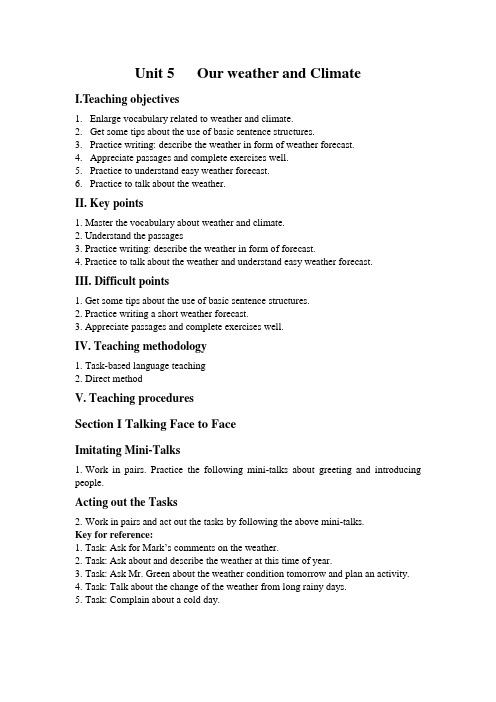
Unit 5 Our weather and ClimateI.Teaching objectives1.Enlarge vocabulary related to weather and climate.2.Get some tips about the use of basic sentence structures.3.Practice writing: describe the weather in form of weather forecast.4.Appreciate passages and complete exercises well.5.Practice to understand easy weather forecast.6.Practice to talk about the weather.II. Key points1.Master the vocabulary about weather and climate.2. Understand the passages3. Practice writing: describe the weather in form of forecast.4. Practice to talk about the weather and understand easy weather forecast.III. Difficult points1. Get some tips about the use of basic sentence structures.2. Practice writing a short weather forecast.3. Appreciate passages and complete exercises well.IV. Teaching methodology1.Task-based language teaching2.Direct methodV. Teaching proceduresSection I Talking Face to FaceImitating Mini-Talks1.Work in pairs. Practice the following mini-talks about greeting and introducing people.Acting out the Tasks2.Work in pairs and act out the tasks by following the above mini-talks.Key for reference:1.Task: Ask for Mark’s comments on the weather.2.Task: Ask about and describe the weather at this time of year.3.Task: Ask Mr. Green about the weather condition tomorrow and plan an activity.4.Task: Talk about the change of the weather from long rainy days.5.Task: Complain about a cold day.Studying Weather Forecasts3.A weather forecast id a statement that tells the public what the weather condition is going to be. We need to watch weather forecasts on TV or hear them over the radio every day.It is part of our life.Read the following samples of weather forecasts carefully and try to use the information to practice short dialogues.Following Sample Dialogues4.Read the following sample dialogues and try to perform your own tasks.Putting Language to Use5.Mr. Parks is talking about the weather of two places in the United States with her students.Read aloud the following dialogue with your partner by putting in the missing words.6.There is going to be s sports meet tomorrow.Bob is worried about the weather and you are talking about it. Fill in the blanks according to the clues given in the brackets. Then act it out with your partner.1.Listen to 10 sentences for workplace communication cross-referenced with their Chinese translations.Script: (e.g) 1. It look likes rain.2. Is it going to be fine this weekend?3. There is a chance of snow this evening.4. Today will be cool and partly cloudy, with a chance of rain this afternoon.5. What’s the temperature today?2.Listen to the following sentences for workplace communication in Column A and match each one with its Chinese version in Column B.3.Listen to 6 sentences for workplace communication and choose their right responses.Handling a Dialogue4.Listen to a dialogue and decode the message by finding out the correct choices in the brackets according to what you have heard.Understanding a Short Speech/Talk5.Now listen to a short speech/talk and fill up the blanks according to what you have heard.The words in brackets will give you some hints.6.Listen to the speech/talk again and complete the information in Column A with the right choices in Column B.Section III Trying Your HandPracticing Applied Writing1.Read the following two samples of weather report and learn to write your own.2.Translate the following weather forecast into Chinese, using the data bank in the Workbook for reference.3.Write an English weather report according to the information given in Chinese. Writing Sentences and Reviewing Grammar4.Analyze the following sentences to see what tense they belong to .5.Correct the errors in the following sentences.6.Translate the following sentences into English.Keys for the exercise:1)The weather was terrible yesterday. In fact, it has been awful.2)She has worked in this office for five years.3)I paid a visit to the Great Wall last year and had a very good time there.4)We have never spoken to each other since we quarreled last time.5)Turn down the TV a bit, the weather forecast hasn’t begun yet.Write and Describe a PictureWrite a short passage of about 100 words to tell a story or about an event related to the picture given below. Some useful words and phrases have been provided to help you.Section IV Maintaining a Sharp EyePassage onermation Related to the Reading Passagenguage Points:3.Explanation of Difficult Sentences1)(para.1) Climate change may be a big problem,but there are many little things we can do to make a difference.Analysis: May can be used to introduce concession in putting forward an argument. 2)(para.1) As we have learned, these greenhouse gases trap energy in the atmosphere and make the Earth warmer.Analysis:As is often used to introduce an indicator of the information source, such as as we have learned. Similar structure are:as the saying goes,as everyone knows, as you know,as you put it,etc.3)(para.3)By turning off lights, the television,and the computer when you are through with them, you can help a lot.Analysis: By is followed by a gerund, introducing a prepositional phrase of manner.Note,by is not necessarily always translated as “通过”.4)(para.8)One of the ways to reduce the amount of greenhouse gases that we put into the air is to buy pro ducts that don’t use as much energy.Analysis:Two That-clauses are used to serve as post-modifiers of nouns:the first one is that we put into the air, modifying greenhouse gases;The second that-clause is that don’t use as much energy, modifying products. Note: In translation, the noun phrase products that use as much energ y can simply be translated into”节能产品”, instead of “不消耗那么多能量的产品”.B. Important Words1)trap:v store(energy, gas or water,etc.)so that it cannot escape.2)Stand-by:n. Readiness for duty.3)Absorb:v. Take in,sack up (liquid,heat,knowledge,etc.)4)Membership: n. Being a member of (an organization)5)Swell:v. (number or amounts) grow bigger; expand.4. Passage Translation5. Read and Think: Answer the following questions according to the passage.6. Read and Complete1)Complete each of the following statements with words or phrases from thepassage.2)Fill in the blanks with the proper words or expressions given below, changing theform if necessary.7. Read and Translate8. Read and SimulatePassage twoInformation Related to the Reading Passagenguage Points:A.Explanation of Difficult Sentences1)(para.1) The most important thing to remember about the weather in Britain is that it often changes.Analysis: To remember about ...is the post modifier of the sentence subject the most important thing, and that introduces the complement clause.2)(para.1)As it is not very common in Britain to have long periods when the weather stays the same day after day, the kind of weather you get will depend not only on the time of year, but also on the luck.Analysis: Within the as-clause of reason, there is a relative clause introduced by when and modifying periods. And in its main clause, there is another relative clause you get modifying weather, with the relative that omitted.3)(para.2) For example, the opportunities for people to meet outside depend a lot on the weather, so you won’t see people meeting or spending time together outdoors asmuch as you do in hotter countries.Analysis:for people to meet outside modifies opportunities.Both meeting or spending time together are the object complement of verb see, and do refers to see...4)(para.3) Foreigners are often amused that the British people spend so much time discussing the weather.Analysis:That is often used to introduce a clause which gives the cause or the effect of an adjective, just like amused in this case.5)(para.4) Another reason is that the British people are reluctant to converse about personal matters with people who are not friends.Analysis:Here that introduces a subject-complement clause, in which a relative who-clause modified people.6)(Para.4) A comment on a nice day or a personal complaint about the rain is an easy way to break the ice.Analysis:Note that when or is used to coordinate two subjects, the verb must agree with the subject after or. To break the ice is an infinitive clause modifying an easy way.B. Important Words1)depend: v. A.change according to(no passive)B. Need someone or something for help or to be able to live.2)opportunity:n. A favorable moment or occasion (for doing sth.)3)Outdoors:ad. In the open air4)Amuse:v. Make someone laugh;cause laughter in5)Climate: n. The average conditions at a particular place over a period of year.6)Discuss:v. Talk about7)Variable:a. Changeable, not steady8)Reluctant:a. Unwilling and therefore perhaps slow to act.9)Converse:v. Talk informally10)Personally:a. Belonging or relating to a particular person, not to others11)Social:a.relating to leisure activities that involve meeting other people12)Comment:v. Make a remark, give an opinion2.Passage Translation3.Read and Judge: True/False4.Read and Translate: Translate the following sentences into Chinese.1)the most important thing to remember about British is the weather.2)People in Britain can enjoy the lovely weather most of the year.3)British people tend to talk about weather quite a lot.4)It is quite common in Britain for people to comment on a rainy day or an lovely day at a bus stop.5)The eating habits of people in Britain have a lot to do with the weather conditions there.6)The best we may use to describe the weather in Britain is “predictable”.7)The variable weather explains why British people talk a lot about it.8)Talking about weather is an inoffensive way to begin a conversation with a stranger in Britain.Section V Appreciating Culture Tips (Open.)。
泛读教程第二版1

泛读教程第二版 1 答案【篇一:泛读教程第二册课后练习答案 1-12 】习答案unit 1 reading word pretest 1-4 abba 5-8 bcbcreading comprehension 1-6 babbccword search1-5 assignment, irony, reverse, accomplish, assemble6-10 squeeze, sensual, fragment, narcotic, adolescenceuse of english1. bob agreed to take on the leadership of the expedition.2. the world was taken in by his fantastic story of having gotto the pole alone.3. he took up his story after a pause for questions and refreshments.o the top of mount fuji.5. the members of the party took it in turns to steer the boat.6. they took it for granted that someone would pick up their signals and come to their aid. synonyms 1-5 adaptability, purpose, strained, hold, defeatcloze important, second, france, student, bilingual, monolingual, serious, means, use, difficultsection b 1-5 fttca 6-10 bbbbt 11-15 tfftt section c 1-5 fttft 6-10 fffffunit 2 musicdecide whether each of the following statements in true orfalse. 1-5 tfttt 6-8 ttfword search1-5 folk, capacity, sensuous, qualified, abuse 6-9 stuff, mood, clarify, strivesemantic variations1-6 bbbbab synonyms1-5 discriminating, widespread, compatibility, clearness, associationcloze music, form, south, dance, interest, instruments, voice, rootssection b1-3 ftf 4-6 fft 7-9 tff 10-12 fft 13-15 tftsection c1-5 daddd 6-8ddaunit 3 generationcircle the letter of the best answer1-5 dccab 6-8 cabword search1-5 lull, associate, client, utterly, certificate 6-10 rags, jerk, foreman, demanding, sentimental semantic variations 1-6 ccbabcantonyms 1-5 hopeless, disobedient, weighty, agree, clear clozeactive, girls, skirts, move, raised, force, show, fly, hesitated, planesection b1-3 bcc 4-6 bcc 7-9 cca 10-12 ccc 13-15 accsection c1-5 ftttf 6-10 ftfttunit 4 weather and climate word pretest 1-5 daaba 6-10 cabdc reading comprehension 1-7 bbbbcabword search1-5 slanting, equator, amplifier, vapor, desert6-10 latitude, altitude, monsoon, drain, precaution synonyms 1-5 mixture, eternal, impact, humidity, remotecloze radio, incorrect, predict, misunderstanding, unexplained, happen, up, rightsection b 1-5 bcaf 6-10 ffftc 11-15 cbtftsection c 1-5 ttftf 6-10 tftffunit 5 work circle the letter of the best answer1-6 caaccb word search1-5 intangible, crave, ego, attributable, stall 6-10 tool up, at stake, cram, forfeit, corny circle the letter of the best answer1-6 badaac synonyms1-5 graceful, spontaneously, oppose, usual, clientcloze staff, maximize, objectives, participate, potential, skills, easier, appointed, specific, commitment section b1-3 acb 4-6 ftf 7-9 acd 10-12 bcb 13-15tftsection c decide whether each of the following statements is true or false.1-5 ftftf 6-10 tftftunit 6 the african-americansdecide whether each of the following statements is true or false.1-4 fttf 5-8 tfttword search1-5 destined, relief, segregation, boycott, sit-in 6-10 legacy, chronicle, assault, plight, vigilancefor each italicized word, decide which semantic variation best expresses the meaning of the author. circle the letter of the best answer. 1-6 cacabcantonyms 1-5 observe, admit, dismiss, eulogize, advancecloze nominated, raised, immigrated, earned, rose, assignment, position, army, autobiography, speakerdecidewhether each of the following statements is true or false.1-3 ttf 4-6 cbd 7-8 dd 9-11 tff 12-14 ftt circle the letter ofthe best answer1-4 addc 5-8 cbdcunit 7 greek stories word pretest 1-5 cbdda 6-10 bbacc reading comprehension 1-4 bccc 5-8 cdcdword searchripplea little wave on the surface of watermischief naughty behavior by childrenhospitality welcoming behaviorbillow a large sea wave spelldelightfulinfluencenymph a goddess of naturebanda group of musicianssuitor a man wishing to marry a particular womanmortal a human being warrior a soldiercrafty cunninghostileunfriendlymerrycheerfultamenot wildcontentsatisfiedresumeto take againgloomdarknessdespise to look down on with contemptdismaya strong feeling of fear, anxiety and hopelessness duskthe time just before nightantonyms 1-5 forbid, clarify, sorrow, remain, conceal cloze name, place, arrows, wandered, power, mischief, won, neglected, celebrate, expedition section b 1-5 ccacd 6-10 ttfff 11-15 ttbbcsection c 1-4 cadb 5-8 adcc unit 8attitude towards life circle theletter of the best answer1-4 cabb 5-8 cbbbword matchastonishing-surprising considerate-thoughtful preach-to advise or urge ⋯strenuous -taking or needing great ⋯aren-an enclosed area ⋯adversity-bad fortune batter-to damagereverse-the opposite penetrate-to see into or throughself-esteem- one’s good opinion of ⋯doom- to cause to suffer ⋯emerg-eto come outor ⋯blessing -a gift from god ⋯mess up-to get into disorder devastating-completely destructivecommon denominator-a quality or belief s hared by all ⋯adds- the probabilities that something.. stack-to arrange dishonestly so as to ⋯motivate -to provide with a strong ⋯falt-elorse strength or effectiveness ⋯for each italicized word, decide which semantic variation best expresses the meaning of the author. circle the letter of the best answer. 1-6 cbbacbantonymsappear, ready, hide, skillful, carelessclozeintelligent, activities, workout, attitude, off, reducing, seem, aside1-3 ccc 4-5 cc 6-8 tft 9-11 ftt 12-15 tfftdecide whether each of the following statements is true or false.1-5 ftftf 6-10 tftffunit 9 first aid word pretest 1-5 bacb 6-10 bbacbreading comprehension1-4 bcdb/d/a/c 5-8 ccac/a/b/dword search1-5 ambulance, urgent, emergency, massage, yell6-10 vein, artery, fracture, blister, tetanususe of english1. the government has come in for a lot of criticism.2. it ’s hard to come to terms with the government ’s defense policy.3. after retiring in 1980 he has decided to make a comeback to the political scene.4. the situation has come to the boil now that the government has to face a vote of confidence.5. the tax cuts announced in the budget do not come intoeffect until next year. 6. the miners came out on strike against the government ’s pirvatization plans.synonyms 1-5 give, stop, antiseptic, block, penetratecloze pedestrians, adults, declining, avoid, signals, case, impaired, fatalitiessection b 1-5 cbbda 6-10 cbatf 11-14 ffttsection c 1-5 ftftf 6-10 fffftunit 10 marriageword pretest 1-4 cccc 5-8 aaacreading comprehension 1-4 abcc 5-8 bcaaword matchquotation a sentence or passage taken from a bookartificial not naturalanguishvery greater pain and suffering, esp. of the mindanniversary a day which is an exact year or number of years after something has happened superstition a belief based on association of ideas instead of reason or factbouqueta bunch of flowersheedto give attention toescortto accompanyconfettismall pieces of colored paper thrown on weddings concealto hideconsentagreementasunderapartvowa solemn promise or declaration of intentionritesforms of behavior with a fixed pattern for a religious purposesermon a talk usually based on a sentence from the bible and given as part of a churchserviceuse of english1. will you please keep me company for a while?2. i couldn ’t keep a straight face when he told me of his plan.3. the staff are going to b e kept in the dark about the firm ’s plans for the future.4. i ’ll keep an open mind until we ’ve discussed it.5. i ’ll keep away from her until she ’s feeling more optimistic.6. try to keep your head even if you don ’t know what ’s going to happen. synonyms 1-5 naughty, divine, break, give, seizecloze wrong, dislike, midnight, standard, homelife, convinced, meantime, capital section b 1-5 tftfb 6-10 ccdcd 11-16 ftfacbsection c 1-5 tfttf 6-10 ftfftunit 11 creativityword pretest 1-4 baab 5-8 abaareading comprehension 1-6 acaaccword matchglowto give out heat or lightinstinctive (of ideas, behaviors) natural, not based on learningor thinkingexemplify to serve as examplefunnela wide-mouthed tube used for pouring liquids into anarrow-necked container preludea short piece of music that introduces a large musical workapplaud to praise by clapping one ’s hands【篇二:泛读教程第一册答案】esection aword pretest1. d2. b3. b4. c5. d6. d7. a8. breading comprehensionl. f2. t 3. f4. t5. f6. f7. t8. fvocabulary buildingword matchrationally in a way based on reason rather than emotions established accepted; recognizedvariousdifferent panic sudden fear consolidate strengthenassignment homeworkbiologicalof living thingsflexiblenot fixedstrenuousstressful; requiring effort and energymasteroverallrecreationway of spending free time estimatecalculate roughlyroutineregular; usual priorityfirstconcern relaxationrest1. flexible2. established3. panic4. strenuous5. priority6. routine7. rationally8. recreationssuffix1. familiarize2. visualize3. merely4. idealize5. finalize6. necessarily7. physically8. highlyclozefavorabletheir respected professors authorityrole expect need several changessection b1. d2. c3. c4. b5. c6. b7. d8. dsection cl. d2. a3. b 4. d5. c6. b7. c8. aunit 2 culture shocksection aword pretest1. c2. a3. d4. c5. c6. b7. a8. dreading comprehension1. c2. d3. d4. d5. d6. cvocabulary buildingword matchexaggerate say more than the truth about something slang nonstandard vocabulary adapt make orbecome suitable insecure weak; uncertain; unprotecteddistinct different; separatechallengingdifficult, but in an interesting wayrange vary within limitsadjust change slightly in order to make suitable aggressiveready for conflictcope with deal withoccur happenidentity the distinguishing character or personality of an individual automatic self-acting; under its own powerdistortion twist; changing shapereverse opposite; contraryl. slang 2. exaggerate 3. cope with 4. reverse5. adapt / adjust6. range / ranged7. occurred8. aggressive suffixl. dividable / divisible2. determination3. dependable4. satisfaction5. correction6. relation7. usable / useable8. recognizable clozeforeignanxiousbehaviormean necessarilyappearunsure approachfrustrationssystemsection bl. c2. b3. d4. c5. c6. d7. b8. dsection cl. c2. b3. b4. d5. b6. c7. a 8. dunit 3 moviesection aword pretestl. b2. d3. b4. c5. d6. b7. a8. dreading comprehensionl. c2. d3. b4. c5. d6. b7. c8. avocabulary buildingword matchnomineecandidatecreate make; inventstare look at for a long timereducedecrease; make lessoverhearaccidentally hear what others are sayingimpressfill someone with admirationexpensecostvictimone who is harmed or killedfloat stay on the surface of the watercynicismdistrustminiaturesmall; tinysubstitutesomething / somebody that takes the place of anothergrateful thankfulscrapescratch awayillusionfalse impressionl. scrape 2. grateful 3. substitute 4. expenses5. reduce6. staring7. impressed8. floatssuffixl. confidence 2. distance 3. devilish 4. presence5. importance6. childish7. patience8. appearanceclozestars drawingsmovieslove rememberkindsserious well-known collecthangingsection bsection cl. t2. t 3. t4. t5. f 6. f7. t8. tunit 4 foodsection aword pretestl. c 2. c 3. c 4. b 5. a 6. c 7. b 8. breading comprehensionl. c 2. b 3. c 4. b 5. a 6. c 7. b 8. cvocabulary buildingword match flavortaste complimentpraisevegetarian one who does not eat meatdairy relating to milk or milk productingredientany of the things that are formed into a mixturedessertsweet food served after the main part of a mealdiet food and drink usually taken by a person barbecuecook food on a metal frame outdoorscuisinefood cooked in a particular styleappetizerfood or drink taken to increase the desire for foodcourteouspolite and kindstaple basic foodportionpart of something largerdoughflour mixed with water ready for baking sufficientenoughl. courteous2. flavor 3. staple 4. ingredients5. barbecue6. compliment7. portion8. sufficientprefixl. disagrees2. misunderstands 3. disappearance4. misleading 5. disadvantage6. misfortune7. discourage 8. misinterpreted clozeingredients called handsincrease rising allowed final ovensection bl. a 2. d 3. c 4. b 5. a 6. d 7. c 8. bsection cl. a 2. c 3. b 4. c 5. b 6. b 7. c 8. bunit 5 businesssection aword pretestl. b 2. b 3. c 4. d 5. c 6. a 7. a 8. creading comprehensionl. d 2. d 3. d 4. d 5. c 6. c 7. a 8. dvocabulary buildingword matchdisputean argument or disagreemententerprisebusiness companyauthenticreal; trueenlightened showing true and deep understanding successora person or thing that follows anotherfacilityequipmentnegotiation discussion aimed at reaching an agreement measurea method for dealing with a situationserial in or forming a series captureseize by forcemultilateral involving more than two groups or countries staff the group of people who work for an organization annualhappening once every yearinfrastructure basic systems and services, such as transport and power supplies commitment a promise or decision to do something1. authentic2. successor3. negotiation4. dispute5 facilities 6. measures 7. multilateral 8. staffsuffix1. minimize7. partial 8.talentedclozespreadconceptreasonsupermarketsestimateleast work price open formsection bsection cl. t 2. t 3. f 4. f 5. f 6. f 7. t 8. f 9. t l0. t泛读教程第二版1答案【篇三:泛读教程第二版第一册unit 8 】txt>1-5 acbcbb ab1-5 ftftf ttfword matchstumble to speak in an uncertain waytentative not certain spouse husbandor wifetyrant a person who uses power cruelly and unjustly broodto spend time thinking sadly about somethingreassurance something said to make someone stop worrying inadequacy being not enough or good enough; being not adequate alienateto cause to become isolated or hostile; estrange persuasive able to cause people to do or believe somethingstrideto walk with quick, long stepsintimidate to threaten; to frightencommitted having made a firm promiseinherit to receive something from ones parentspersonality character; individuality6.brooding7.alienated8.stridingsuffixes8.helpfulclozese7.differently 8.service9.low10.physical1-5 cabaa bcc1-5 bbbbc bab1 / 11。
新编实用英语综合教程1第四版(部分单元)
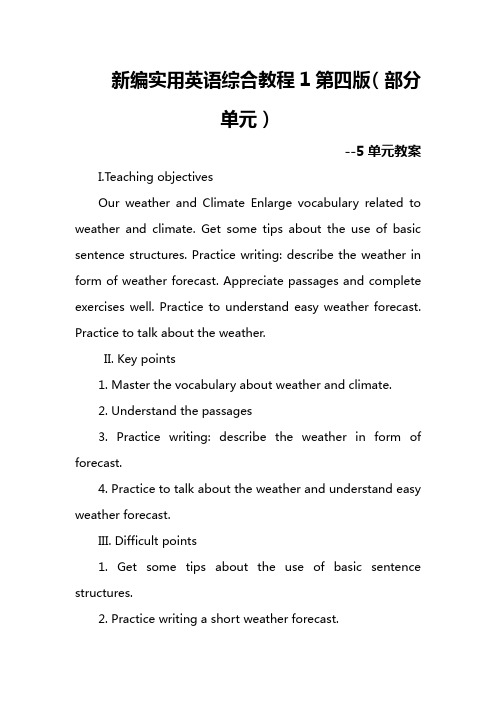
新编实用英语综合教程1第四版(部分单元)--5单元教案I.Teaching objectivesOur weather and Climate Enlarge vocabulary related to weather and climate. Get some tips about the use of basic sentence structures. Practice writing: describe the weather in form of weather forecast. Appreciate passages and complete exercises well. Practice to understand easy weather forecast. Practice to talk about the weather.II. Key points1. Master the vocabulary about weather and climate.2. Understand the passages3. Practice writing: describe the weather in form of forecast.4. Practice to talk about the weather and understand easy weather forecast.III. Difficult points1. Get some tips about the use of basic sentence structures.2. Practice writing a short weather forecast.3. Appreciate passages and complete exercises well.IV. Teaching methodology1. Task-based language teaching2. Direct method V. Teaching procedures Section I Talking Face to Face Imitating Mini-Talks 1. Work in pairs. Practice the following mini-talks about greeting and introducing people. Acting out the T asks 2. Work in pairs and act out the tasks by following the above mini-talks.Key for reference:1.Task: Ask for Mark’s comments on the weather.2.T ask: Ask about and describe the weather at this time of year.3.3. T ask: Ask Mr. Green about the weather condition tomorrow and plan an activity.4.4. Task: Talk about the change of the weather from long rainy days.5.5. Task: Complain about a cold day. Studying Weather Forecasts6.A weather forecast id a statement that tells the public what the weather condition is going to be. We need to watch weather forecasts on TV or hear them over the radio every day.It is part of our life.Read the following samples of weatherforecasts carefully and try to use the information to practice short dialogues. Following Sample Dialogues7.Read the following sample dialogues and try to perform your own tasks. Putting Language to Use8.Mr. Parks is talking about the weather of two places in the United States with her students.Read aloud the following dialogue with your partner by putting in the missing words.9.There is going to be s sports meet tomorrow.Bob is worried about the weather and you are talking about it. Fill in the blanks according to the clues given in the brackets. Then act it out with your partner.1. Listen to 10 sentences for workplace communication cross-referenced with their Chinese translations.Script: (e.g) 1. It look likes rain. 2. Is it going to be fine this week。
天气和季节的描述英语作文
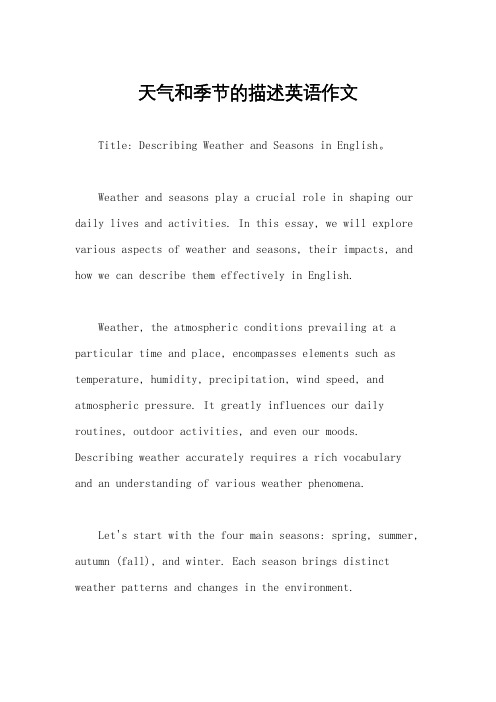
天气和季节的描述英语作文Title: Describing Weather and Seasons in English。
Weather and seasons play a crucial role in shaping our daily lives and activities. In this essay, we will explore various aspects of weather and seasons, their impacts, and how we can describe them effectively in English.Weather, the atmospheric conditions prevailing at a particular time and place, encompasses elements such as temperature, humidity, precipitation, wind speed, and atmospheric pressure. It greatly influences our daily routines, outdoor activities, and even our moods. Describing weather accurately requires a rich vocabulary and an understanding of various weather phenomena.Let's start with the four main seasons: spring, summer, autumn (fall), and winter. Each season brings distinct weather patterns and changes in the environment.Spring is characterized by moderate temperatures, blooming flowers, and rejuvenation in nature after the cold winter months. The weather is often mild, with occasional rain showers. People describe spring as a time of renewal and growth.Summer is typically the hottest season of the year, with long days and warm nights. The sun shines brightly, and temperatures can soar, especially in regions with a continental climate. People enjoy outdoor activities like swimming, hiking, and picnics during this time.Autumn, also known as fall, marks the transition from summer to winter. The weather becomes cooler, and leaves on deciduous trees change color and eventually fall. Autumn is often associated with harvest festivals, pumpkin patches, and cozy evenings by the fireplace.Winter is characterized by cold temperatures, snowfall, and shorter days. In colder regions, lakes freeze over, and snow blankets the landscape, creating a winter wonderland. People engage in activities like skiing, snowboarding, andbuilding snowmen during this season.Now, let's delve into describing specific weather conditions in English:1. Clear and Sunny: When the sky is clear and the sunis shining brightly, we describe it as a sunny day. Phrases like "blue skies," "bright sunshine," and "warm rays of the sun" can be used to vividly portray such weather conditions.2. Cloudy: When the sky is covered with clouds,blocking the sun, we describe it as cloudy weather. Phrases such as "overcast skies," "cloudy with a chance of rain," and "gray clouds looming overhead" help convey this atmosphere.3. Rainy: Rainy weather brings precipitation in theform of raindrops falling from the sky. We can describe it as "rainy," "showery," or "drizzling." Words like "pitter-patter of raindrops," "rain-soaked streets," and "umbrellas unfurled" paint a picture of a rainy day.4. Snowy: Snowfall transforms the landscape into a winter wonderland. Descriptive phrases such as "blanket of snow," "flurries in the air," and "frosty temperatures" capture the essence of snowy weather.5. Windy: Windy weather is characterized by strong gusts of wind blowing through the air. We can describe it as "blustery," "wind-whipped," or "breezy." Phrases like "trees swaying in the wind," "howling winds," and "wind chill factor" help illustrate windy conditions.6. Foggy: When dense fog obscures visibility, we describe it as foggy weather. Words like "thick fog," "misty morning," and "visibility reduced to a few feet" convey the atmospheric conditions associated with fog.7. Stormy: Stormy weather brings thunderstorms, lightning, and heavy rainfall. Descriptive phrases such as "rumble of thunder," "flashes of lightning," and "torrential downpour" paint a vivid picture of stormy conditions.In conclusion, weather and seasons provide a rich tapestry of experiences and moods throughout the year. By mastering descriptive language and vocabulary related to weather, we can effectively communicate and express our observations and experiences in English. Whether it's a sunny day in summer or a snowy evening in winter, the language allows us to capture the essence of the weather and seasons with clarity and precision.。
全新版《大学英语》教案(第二册)
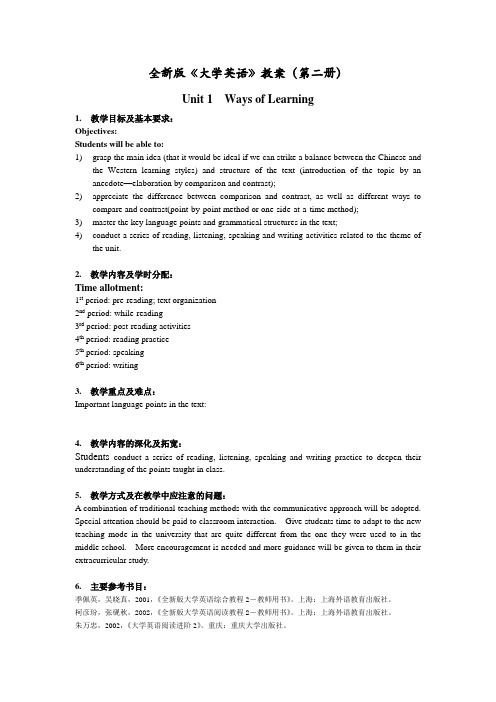
全新版《大学英语》教案(第二册)Unit 1 Ways of Learning1.教学目标及基本要求:Objectives:Students will be able to:1)grasp the main idea (that it would be ideal if we can strike a balance between the Chinese andthe Western learning styles) and structure of the text (introduction of the topic by an anecdote—elaboration by comparison and contrast);2)appreciate the difference between comparison and contrast, as well as different ways tocompare and contrast(point-by-point method or one-side-at-a-time method);3)master the key language points and grammatical structures in the text;4)conduct a series of reading, listening, speaking and writing activities related to the theme ofthe unit.2. 教学内容及学时分配:Time allotment:1st period: pre-reading; text organization2nd period: while-reading3rd period: post-reading activities4th period: reading practice5th period: speaking6th period: writing3. 教学重点及难点:Important language points in the text:4. 教学内容的深化及拓宽:Students conduct a series of reading, listening, speaking and writing practice to deepen their understanding of the points taught in class.5. 教学方式及在教学中应注意的问题:A combination of traditional teaching methods with the communicative approach will be adopted. Special attention should be paid to classroom interaction. Give students time to adapt to the new teaching mode in the university that are quite different from the one they were used to in the middle school. More encouragement is needed and more guidance will be given to them in their extracurricular study.6. 主要参考书目:季佩英,吴晓真,2001,《全新版大学英语综合教程2-教师用书》。
英语口语话题:天气(the weather)
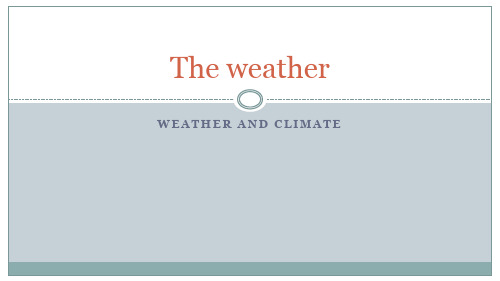
What month gets the most rain around here?
Temperature Vocabulary:
C = CELCIUS K = KELVIN F = FAHRENHEIT
Mexico is renowned for its hot climate and spicy food.
ocabulary
to climb
if a temperature, price, or the level of something climbs, it becomes higher
Something is blocking the flow of water through the pipe.
to blow
if wind or air blows, the air moves
A strong wind was blowing across the moors.
Vocabulary
calm
if the weather is calm, there is very l
We’re going to see a period of calmer weather starting this weekend.
climate
the type of weather that a country or region has
altitude
the height of a place or object above sea level.
Breathing can be difficult at high altitudes.
关于天气的词语 英语
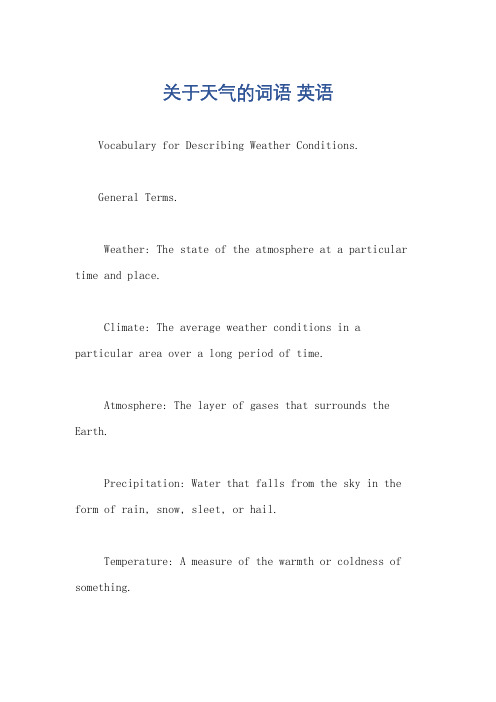
关于天气的词语英语Vocabulary for Describing Weather Conditions.General Terms.Weather: The state of the atmosphere at a particular time and place.Climate: The average weather conditions in a particular area over a long period of time.Atmosphere: The layer of gases that surrounds the Earth.Precipitation: Water that falls from the sky in the form of rain, snow, sleet, or hail.Temperature: A measure of the warmth or coldness of something.Humidity: The amount of water vapor in the air.Wind: The movement of air.Cloud: A visible mass of water droplets or ice crystals suspended in the atmosphere.Types of Precipitation.Rain: Liquid water droplets that fall from the sky.Snow: Frozen water crystals that fall from the sky.Sleet: A mixture of rain and snow that falls from the sky.Hail: Balls or chunks of ice that fall from the sky.Drizzle: Very light rain that falls in fine drops.Downpour: Heavy rain that falls in a short period of time.Mist: A thin layer of water droplets that hangs in the air near the ground.Fog: A thick layer of water droplets that hangs in the air near the ground and reduces visibility.Types of Clouds.Cirrus: Thin, wispy clouds made of ice crystals.Cumulus: Puffy clouds that look like cotton balls.Stratus: Flat, gray clouds that cover the sky.Altostratus: Thin, gray clouds that cover the sky and block the sun.Nimbostratus: Dark, gray clouds that produce rain or snow.Cumulonimbus: Tall, puffy clouds that can producethunderstorms.Wind Conditions.Calm: No wind or very light wind.Breeze: Gentle wind that moves leaves and twigs.Windy: Strong wind that makes trees sway and can blow objects around.Gale: Very strong wind that can cause damage to property.Hurricane: A powerful tropical storm with winds of 74 miles per hour or more.Tornado: A violent rotating column of air that touches the ground.Temperature Terms.Hot: A temperature that feels warm or uncomfortable to the touch.Warm: A temperature that feels comfortable to the touch.Cool: A temperature that feels slightly cold to the touch.Cold: A temperature that feels uncomfortable to the touch.Freezing: A temperature at which water freezes.Boiling: A temperature at which water boils.Humidity Terms.Dry: Air that contains little water vapor.Humid: Air that contains a lot of water vapor.Saturated: Air that contains all the water vapor itcan hold.Dew point: The temperature at which the air becomes saturated and water vapor condenses into dew.Other Weather Terms.Barometer: An instrument used to measure atmospheric pressure.Anemometer: An instrument used to measure wind speed.Thermometer: An instrument used to measure temperature.Hygrometer: An instrument used to measure humidity.Weather forecast: A prediction of the weatherconditions for a future time.Weather warning: A message issued by a weather service to warn people of dangerous weather conditions.。
和春天相关的词汇英语
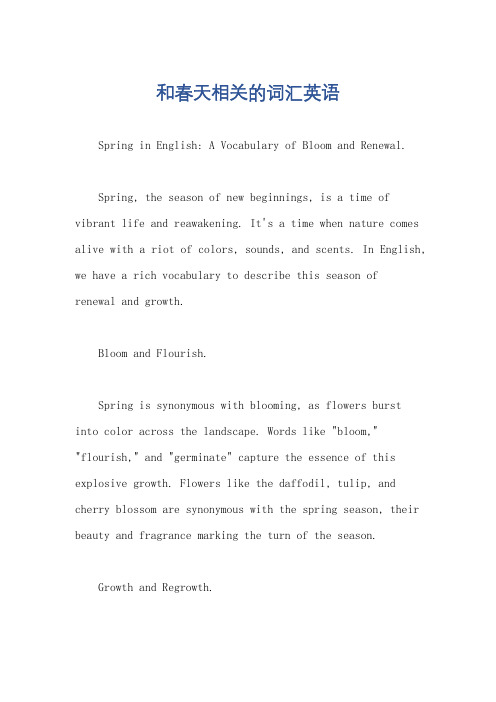
和春天相关的词汇英语Spring in English: A Vocabulary of Bloom and Renewal.Spring, the season of new beginnings, is a time of vibrant life and reawakening. It's a time when nature comes alive with a riot of colors, sounds, and scents. In English, we have a rich vocabulary to describe this season ofrenewal and growth.Bloom and Flourish.Spring is synonymous with blooming, as flowers burstinto color across the landscape. Words like "bloom," "flourish," and "germinate" capture the essence of this explosive growth. Flowers like the daffodil, tulip, and cherry blossom are synonymous with the spring season, their beauty and fragrance marking the turn of the season.Growth and Regrowth.Spring is a time of growth, not only for plants butalso for animals and even the earth itself. Terms like "sprout," "bud," and "greenen" describe the visible signsof this growth. Trees and shrubs put on new leaves, grass turns green, and vines creep up trellises, all symbols of the renewal of life.Weather and Climate.The weather in spring is often described as "mild" or "temperate," with temperatures neither too hot nor too cold. The sun shines brightly, and the sky is often clear and blue. Rainfall is often light and intermittent, giving wayto sunny spells that encourage outdoor activities.Wildlife and Nature.Wildlife comes out of hibernation in spring, and theair is filled with the sounds of birds singing and animals returning to their habitats. Terms like "swarm," "flock," and "migrate" describe the movements of birds and insectsas they take advantage of the new season. Butterfliesflutter through the air, bees buzz around flowers, and birds build nests in preparation for the arrival of new life.Festivals and Customs.Spring is also a time for festivals and customs, many of which celebrate the arrival of the new season. In England, for example, the Spring Equinox marks the balance between day and night, symbolizing the rebirth of the sun and longer days ahead. Other cultures have their own spring festivals, each with their own unique traditions and symbols.In Conclusion.Spring is a season of new beginnings, a time of growth and renewal. The English language is rich in vocabulary to describe this season, from the blooming of flowers and the greening of leaves to the sounds and sights of wildlife returning to life. It's a time to embrace the outdoors, to feel the warmth of the sun on our faces and the freshnessof the air in our lungs. It's a time to celebrate life and its infinite possibilities.。
天气的英文单词大全
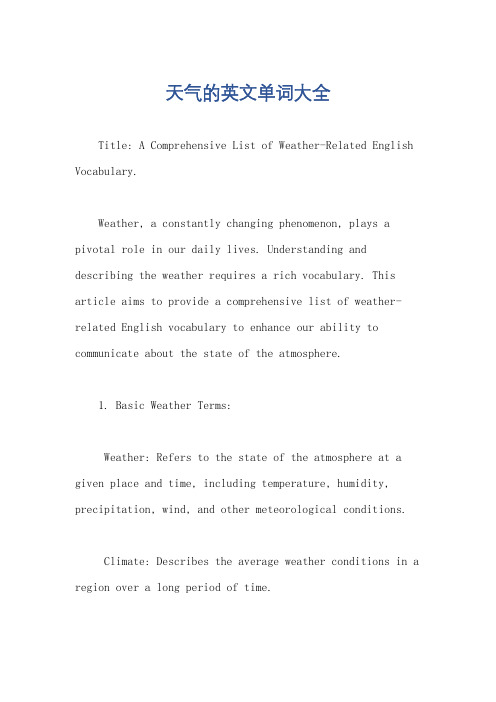
天气的英文单词大全Title: A Comprehensive List of Weather-Related English Vocabulary.Weather, a constantly changing phenomenon, plays a pivotal role in our daily lives. Understanding and describing the weather requires a rich vocabulary. This article aims to provide a comprehensive list of weather-related English vocabulary to enhance our ability to communicate about the state of the atmosphere.1. Basic Weather Terms:Weather: Refers to the state of the atmosphere at a given place and time, including temperature, humidity, precipitation, wind, and other meteorological conditions.Climate: Describes the average weather conditions in a region over a long period of time.Forecast: A prediction of future weather conditions, based on scientific observations and models.2. Types of Weather Conditions:Sunny: Describes a clear sky with no clouds and sunlight shining brightly.Cloudy: Refers to a sky covered with clouds, reducing the amount of sunlight reaching the ground.Rainy: Describes precipitation in the form of water droplets falling from the sky.Snowy: Refers to precipitation in the form of ice crystals falling from the sky.Windy: Describes conditions with strong winds, usually accompanied by gusts and changes in wind direction.Foggy: Describes conditions with visibility reduced by a layer of water droplets or ice crystals suspended in theair.3. Weather Phenomena:Thunderstorm: A weather condition characterized by heavy rain, strong winds, thunder, and lightning.Hail: Small balls of ice that fall from the sky during thunderstorms.Tornado: A violent rotating column of air that touches the ground, often causing severe damage.Hurricane: A large tropical cyclone that forms over tropical or subtropical waters and brings strong winds, heavy rain, and flooding.4. Temperature and Humidity Terms:Hot: Describes temperatures that are above average and uncomfortable for most people.Cold: Describes temperatures that are below average and uncomfortable for most people.Humid: Refers to conditions with high water vapor content in the air, often causing discomfort and increased perspiration.Dry: Describes conditions with low water vapor content in the air, often leading to dry skin and throat.5. Wind Terms:Gentle Breeze: A light wind that blows gently, causing only minimal disturbance.Moderate Wind: A stronger wind that blows with some force, causing noticeable movement of trees and branches.Strong Wind: A very strong wind that blows vigorously, causing widespread damage and potential safety hazards.Gale: A very strong wind with speeds exceeding 64kilometers per hour (40 miles per hour), causing severe damage and potential danger.6. Weather Instruments and Measurements:Thermometer: An instrument used to measure temperature.Barometer: An instrument used to measure atmospheric pressure, often used to predict changes in weather conditions.Rain Gauge: An instrument used to measure the amountof rainfall in a given period of time.Wind Gauge: An instrument used to measure wind speed and direction.In conclusion, weather vocabulary is vast and diverse, reflecting the infinite permutations and combinations of atmospheric conditions.Mastering this vocabulary not only enhances our ability to communicate about the weather butalso allows us to appreciate the beauty and power of nature's ever-changing landscape.。
2024小学英语五年级人教版下册《Weather and Climate》教案

2024小学英语五年级人教版下册《Weatherand Climate》教案Lesson Plan: Weather and ClimateObjective:- To introduce and familiarize students with the topic of weather and climate.- To teach students basic vocabulary related to weather and climate.- To enable students to describe different types of weather and climate using appropriate vocabulary.- To reinforce the understanding of weather and climate through engaging activities.Materials Needed:- Weather flashcards- Worksheets on weather vocabulary- Pictures depicting different types of weather and climate- Video clips showing different weather conditionsWarm-up (10 minutes):1. Greet the students and ask them to share their favorite type of weather.2. Show pictures of different weather conditions and elicit vocabulary related to weather from the students.3. Introduce the topic of weather and climate by explaining the difference between the two terms.Presentation (15 minutes):1. Use flashcards to teach and practice vocabulary related to different weather conditions, such as sunny, cloudy, rainy, snowy, windy, etc.2. Show pictures depicting various weather conditions and ask students to identify and describe them using the newly learned vocabulary.3. Play video clips showing different weather conditions and ask students to describe what they see.Practice (20 minutes):1. Distribute worksheets on weather vocabulary and ask students to match the words with corresponding pictures.2. In pairs or small groups, students should take turns asking and answering questions about the weather using the vocabulary they have learned.3. Divide the class into two groups and play a weather-themed vocabulary game. Each group takes turns describing a weather condition, and the opposing group has to guess the word. The group with the most correct guesses wins.Production (25 minutes):1. Divide the class into groups and assign each group a specific type of weather or climate (e.g., hot and dry, cold and snowy, etc.).2. In their groups, students should create a short skit or dialogue that involves the assigned weather or climate. They can use the vocabulary they have learned to describe the scene and the characters' reactions to the weather.3. Each group presents their skit to the class, while the rest of the students listen and try to guess the type of weather or climate portrayed.Wrap-up (5 minutes):1. Ask students to reflect on what they have learned about weather and climate during the lesson.2. Review the vocabulary by giving a quick quiz or playing a vocabulary game.3. Thank the students for their participation and encourage them to observe and discuss different types of weather in their daily lives.Note: This lesson plan is flexible and can be adapted according to the specific needs and resources of the classroom. It is important to gauge the students' prior knowledge and adjust the activities accordingly.。
英语八年级下册第2单元作文范文
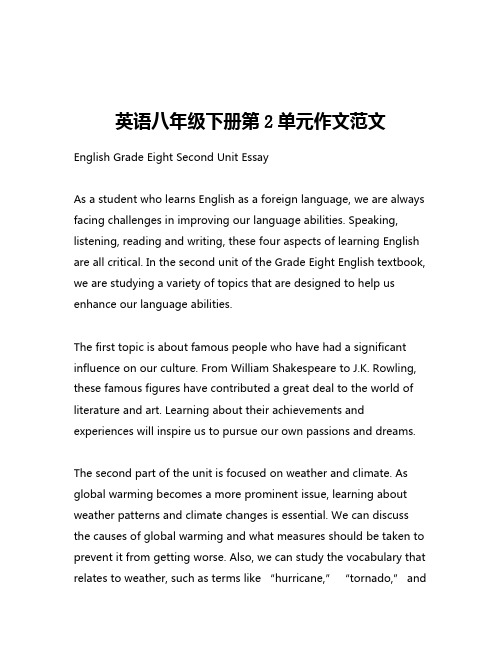
英语八年级下册第2单元作文范文English Grade Eight Second Unit EssayAs a student who learns English as a foreign language, we are always facing challenges in improving our language abilities. Speaking, listening, reading and writing, these four aspects of learning English are all critical. In the second unit of the Grade Eight English textbook, we are studying a variety of topics that are designed to help us enhance our language abilities.The first topic is about famous people who have had a significant influence on our culture. From William Shakespeare to J.K. Rowling, these famous figures have contributed a great deal to the world of literature and art. Learning about their achievements and experiences will inspire us to pursue our own passions and dreams.The second part of the unit is focused on weather and climate. As global warming becomes a more prominent issue, learning about weather patterns and climate changes is essential. We can discuss the causes of global warming and what measures should be taken to prevent it from getting worse. Also, we can study the vocabulary that relates to weather, such as terms like “hurricane,” “tornado,” and“typhoon.”The third section of the unit is about influential and courageous people. We can learn about people like Rosa Parks and Martin Luther King Jr., who stood up for what they believed in and fought for equal rights for all. These people are great examples of how an individual can make a significant impact on the world.The last part of the unit focuses on sports, which is always a popular topic. We can learn about famous athletes such as Michael Jordan and Cristiano Ronaldo. We can also enhance our vocabulary by studying sports-related expressions like “slam dunk” and “score a goal.”In short, the second unit of the Grade Eight English textbook is an essential part of our English learning journey. By mastering the topics in this unit, we will improve our language skills and broaden our knowledge. Let us take advantage of these learning opportunities and strive to become better English learners.。
如何形容一个地方的天气英语作文
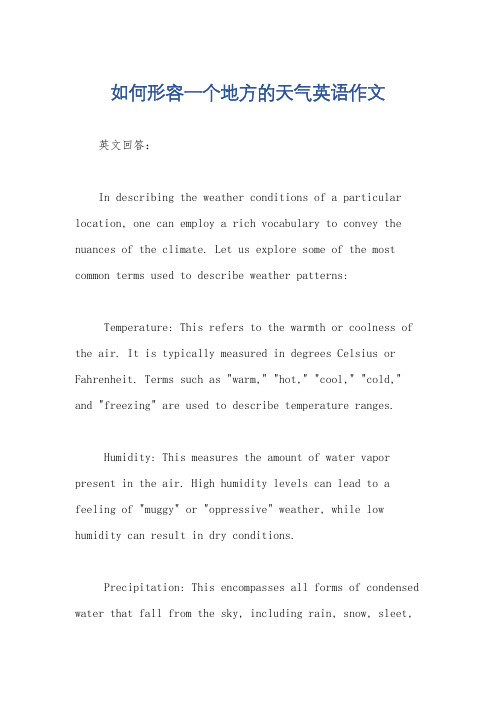
如何形容一个地方的天气英语作文英文回答:In describing the weather conditions of a particular location, one can employ a rich vocabulary to convey the nuances of the climate. Let us explore some of the most common terms used to describe weather patterns:Temperature: This refers to the warmth or coolness of the air. It is typically measured in degrees Celsius or Fahrenheit. Terms such as "warm," "hot," "cool," "cold," and "freezing" are used to describe temperature ranges.Humidity: This measures the amount of water vapor present in the air. High humidity levels can lead to a feeling of "muggy" or "oppressive" weather, while low humidity can result in dry conditions.Precipitation: This encompasses all forms of condensed water that fall from the sky, including rain, snow, sleet,and hail. The intensity and duration of precipitation can vary greatly, resulting in terms such as "drizzle," "shower," "downpour," and "storm."Wind: This refers to the movement of air. Its speed can be described as "calm," "breezy," "windy," or "gale-force." The direction of the wind can also be noted, using terms such as "easterly," "westerly," or "northerly."Cloud cover: This describes the amount of the sky that is covered by clouds. It can be expressed as a percentage or using terms such as "clear," "partly cloudy," "overcast," and "foggy."Visibility: This refers to the distance at which objects can be clearly seen. Poor visibility can be caused by factors such as fog, haze, or smoke.Atmospheric pressure: This measures the weight of the air above a given point. High atmospheric pressuretypically indicates stable weather conditions, while low atmospheric pressure can lead to stormy or unsettledweather.中文回答:在描述某个地方的天气状况时,我们可以使用丰富的词汇来传达气候的细微差别。
描写英语天气的单词

描写英语天气的单词Describing Weather in English.Weather, a crucial aspect of our daily lives, is often talked about and described in various languages. English, being a global language, has a rich vocabulary to describe weather conditions. This article delves into the numerous words and phrases used to depict weather in English.1. Sunny.The most basic and pleasant weather condition is sunny. When the sun shines brightly without any clouds, we call it sunny. The adjective "sunny" is often used to describe such weather. For example, "It's a sunny day, perfect for a picnic."2. Cloudy.On the other hand, when the sky is covered with clouds,we say it's cloudy. The adjective "cloudy" is used to describe this condition. For instance, "The forecast saysit's going to be cloudy tomorrow."3. Rainy.When water droplets fall from the clouds to the ground, we call it rain. Rainy weather is described using the adjective "rainy". For instance, "I hope I remember to bring an umbrella; it's a rainy day."4. Stormy.A storm is a severe weather condition characterized by strong winds, heavy rain, and possibly thunder and lightning. The adjective "stormy" is used to describe such weather. For example, "The ship couldn't sail because it was a stormy night."5. Snowy.When it's cold and ice crystals fall from the sky, wecall it snow. Snowy weather is described using the adjective "snowy". For instance, "Christmas in a snowy village is truly magical."6. Windy.Strong winds blowing are described as windy weather. The adjective "windy" is used in such descriptions. For example, "It's so windy today; I can hardly walk with my umbrella."7. Humid.When the air feels damp and sticky, it's because of high water vapor content. Such weather is described as humid. The adjective "humid" is used in this context. For instance, "The summer in this part of the country can be quite humid."8. Mild.Mild weather refers to temperatures that are neithertoo hot nor too cold, making it comfortable for most people. The adjective "mild" is used to describe such weather. For example, "The mild climate of this city is perfect foryear-round outdoor activities."9. Chilly.When the temperature is slightly below comfortable levels, but not cold enough to be described as freezing, we call it chilly. The adjective "chilly" is used in this context. For instance, "It's a bit chilly outside, youmight want to put on a jacket."10. Freezing.When the temperature is very low, to the point where water freezes, we say it's freezing. The adjective "freezing" is used to describe such weather. For example, "The temperature dropped to freezing last night, so there's ice on the road."11. Foggy.Fog is a weather condition where visibility is reduced due to a layer of water droplets suspended in the air close to the ground. Foggy weather is described using the adjective "foggy". For instance, "Driving in foggy conditions can be quite hazardous."12. Hazy.Hazy weather refers to a lack of clarity in the air, often caused by dust, smoke, or other particles. The adjective "hazy" is used to describe such conditions. For example, "The city looked hazy from the mountain top due to the smog."13. Blasting Heat.In hot regions, extremely high temperatures can be described as blasting heat. Phrases like "It's blasting hot today" or "The blasting heat made it difficult to go outside" are common.14. Bitter Cold.In cold regions, extremely low temperatures can be described as bitter cold. Phrases like "The bitter cold made our noses run" or "It was bitter cold outside, we had to wrap up warm" are often used.15. Balmy.Balmy weather refers to a pleasantly warm temperature, often with a slight breeze. The adjective "balmy" is used in this context. For instance, "The balmy evening breeze was a welcome change from the hot day."16. Bracing.Bracing weather refers to cold temperatures that are invigorating or stimulating. The adjective "bracing" is used in this context. For example, "A bracing walk in the cold air helped to clear my mind."17. Broiling.Broiling weather is extremely hot and usually refers to the intense heat of a summer day. The adjective "broiling" is used to describe such weather. For instance, "It was broiling hot in the car, we had to roll down the windows."18. Chilly.As mentioned earlier, chilly refers to a slightly cool or uncomfortable temperature. However, it can also be used to describe a refreshing coolness, such as a chilly breeze on a hot day. For example, "The chilly mountain air was a welcome relief from the heat."19. Damp.Damp weather refers to conditions where the air feels moist or wet, often due to high humidity or recent rain. The adjective "damp" is used in this context. For instance, "The dampness in the air made the clothes feel heavy and uncomfortable."20. Dry.In contrast to damp weather, dry weather refers to conditions where there is little or no moisture in the air. The adjective "dry" is used to describe such weather. For example, "The dry heat of the desert was unbearable; we needed to find shade immediately."In conclusion, English has a vast array of words and phrases to describe various weather conditions. From the pleasant and sunny to the severe and stormy, we can accurately portray the weather using these descriptive adjectives and nouns. Whether it's a balmy breeze or a blasting heatwave, English speakers have the vocabulary to convey the weather perfectly.。
新概念英语第三册第三课课文

新概念英语第三册第三课课文The text "New Concept English Third Edition Lesson Three" is a part of a popular English language learning series. This particular lesson focuses on a conversation between two people, Mr. Brown and Mrs. Smith, discussing the topic of weather. The dialogue is a great example for English learners to practice their listening and speaking skills, as well as to expand their vocabulary related to weather and climate.The text begins with Mr. Brown expressing his surprise at the weather, stating that it's a lovely day. Mrs. Smith responds by saying that it's not really a lovely day because it's too hot. This exchange sets the stage for a conversation about the weather, a topic that is often used as a conversation starter in English-speaking countries.As the conversation continues, Mr. Brown and Mrs. Smith discuss the extreme weather conditions in different parts of the world. Mr. Brown mentions that it's snowing in thenorth, while Mrs. Smith talks about the heat in the south. This part of the text provides valuable cultural and geographical information, as well as vocabulary related to different types of weather conditions.Throughout the dialogue, Mr. Brown and Mrs. Smith use a variety of expressions and idioms related to weather. For example, Mr. Brown says, "It's a bit too hot for me," and Mrs. Smith responds with, "You can say that again." These expressions are commonly used in everyday English conversations, so it's beneficial for English learners to become familiar with them.In addition to vocabulary and expressions, the text also provides an opportunity for learners to practice their listening skills. By reading the conversation and listening to the audio recording, students can improve their comprehension and pronunciation. This type of interactive learning is essential for language acquisition and fluency.Furthermore, the text offers a glimpse into thecultural differences in how people perceive and react toweather. While Mr. Brown sees the sunny weather as lovely, Mrs. Smith finds it too hot. This reflects the diversity of opinions and experiences that people have with weather, which is an important aspect of understanding and communicating in a foreign language and culture.In conclusion, the "New Concept English Third Edition Lesson Three" text is a valuable resource for English language learners. It provides a rich dialogue about weather, offering vocabulary, expressions, cultural insights, and listening practice. By engaging with this text, students can improve their language skills and gain a deeper understanding of English-speaking cultures.。
天气预报英语学习计划大学
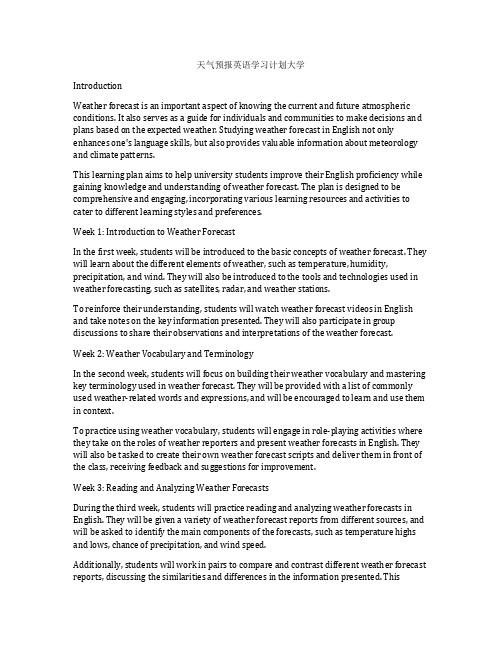
天气预报英语学习计划大学IntroductionWeather forecast is an important aspect of knowing the current and future atmospheric conditions. It also serves as a guide for individuals and communities to make decisions and plans based on the expected weather. Studying weather forecast in English not only enhances one's language skills, but also provides valuable information about meteorology and climate patterns.This learning plan aims to help university students improve their English proficiency while gaining knowledge and understanding of weather forecast. The plan is designed to be comprehensive and engaging, incorporating various learning resources and activities to cater to different learning styles and preferences.Week 1: Introduction to Weather ForecastIn the first week, students will be introduced to the basic concepts of weather forecast. They will learn about the different elements of weather, such as temperature, humidity, precipitation, and wind. They will also be introduced to the tools and technologies used in weather forecasting, such as satellites, radar, and weather stations.To reinforce their understanding, students will watch weather forecast videos in English and take notes on the key information presented. They will also participate in group discussions to share their observations and interpretations of the weather forecast.Week 2: Weather Vocabulary and TerminologyIn the second week, students will focus on building their weather vocabulary and mastering key terminology used in weather forecast. They will be provided with a list of commonly used weather-related words and expressions, and will be encouraged to learn and use them in context.To practice using weather vocabulary, students will engage in role-playing activities where they take on the roles of weather reporters and present weather forecasts in English. They will also be tasked to create their own weather forecast scripts and deliver them in front of the class, receiving feedback and suggestions for improvement.Week 3: Reading and Analyzing Weather ForecastsDuring the third week, students will practice reading and analyzing weather forecasts in English. They will be given a variety of weather forecast reports from different sources, and will be asked to identify the main components of the forecasts, such as temperature highs and lows, chance of precipitation, and wind speed.Additionally, students will work in pairs to compare and contrast different weather forecast reports, discussing the similarities and differences in the information presented. Thisactivity will help them develop critical thinking skills and discern the accuracy and reliability of weather forecasts.Week 4: Listening and Comprehension SkillsIn the fourth week, students will focus on improving their listening and comprehension skills in the context of weather forecast. They will listen to weather forecast podcasts and audio recordings, paying close attention to the pronunciation and intonation of the presenters.To assess their comprehension, students will be given listening comprehension exercises based on the weather forecast recordings. They will practice summarizing the key points of the forecasts and identifying the specific details mentioned, such as weather patterns, atmospheric conditions, and potential weather hazards.Week 5: Writing Weather ForecastsIn the fifth week, students will work on their writing skills by composing their own weather forecasts in English. They will be provided with templates and guidelines for structuring a weather forecast report, including the introduction, body, and conclusion.To ensure accuracy and clarity in their writing, students will peer-edit and revise their weather forecast reports, focusing on grammar, vocabulary usage, and coherence. They will also have the opportunity to receive feedback from their instructors and classmates to further refine their writing.Week 6: Interactive Weather Forecast Games and QuizzesThroughout the sixth week, students will engage in interactive games and quizzes related to weather forecast in English. They will participate in online quizzes to test their knowledge of weather-related vocabulary, terminology, and concepts. They will also play weather forecast simulation games, where they take on the role of weather forecasters and make predictions based on given scenarios.These interactive activities will make learning about weather forecast more engaging and enjoyable for the students, while reinforcing their understanding of the material.Week 7: Field Trip to Weather StationIn the seventh week, students will have the opportunity to visit a local weather station to observe firsthand the equipment and processes involved in weather forecasting. They will have the chance to interact with meteorologists and ask questions about the tools and techniques used to collect weather data and make predictions.Following the field trip, students will be required to write a reflection on their experience and what they learned from the visit. This will allow them to connect theoretical knowledge with practical application and gain a deeper appreciation for weather forecasting.Week 8: Presentation on Weather PhenomenaIn the final week, students will prepare and deliver presentations on specific weather phenomena, such as hurricanes, tornadoes, and blizzards, in English. They will conduct research on the causes, characteristics, and impacts of these weather events, and present their findings to their peers and instructors.Through these presentations, students will demonstrate their command of English language and their understanding of weather-related topics, while also developing their public speaking skills.ConclusionThis weather forecast English learning plan offers a comprehensive and interactive approach to improving language proficiency and gaining knowledge of meteorology. By engaging in a variety of activities and accessing different learning resources, university students will be able to enhance their listening, speaking, reading, and writing skills in English, while also deepening their understanding of weather forecast. This well-rounded approach ensures that students have the opportunity to explore and appreciate weather forecast from multiple perspectives, and find relevance in their language learning journey.。
九上英语第五单元笔记

九上英语第五单元笔记Unit 5: WeatherIntroduction:In the fifth unit of the ninth grade English curriculum, we will explore the topic of weather. Weather plays a significant role in our daily lives, influencing our activities, clothing choices, and even our moods. Understanding weather-related vocabulary and concepts is crucial for effective communication, particularly when discussing travel plans, daily routines, and outdoor activities. In this unit, we will learn about different types of weather, how to describe and predict the weather, and discuss climate change.1. Types of Weather:Weather encompasses a range of conditions experienced in the Earth's atmosphere. It includes phenomena such as sunshine, rain, snow, fog, wind, and temperature. Learning the vocabulary associated with different weather types is essential. For example, sunny, cloudy, rainy, snowy, and stormy are common terms used to describe the weather. By understanding these terms, we can effectively communicate about our experiences and plan accordingly.2. Describing the Weather:Being able to describe the weather accurately is crucial, as it allows us to convey information and engage in conversations. To describe the weather, we need to consider various factors, including temperature, precipitation, wind speed, and cloud cover. Using descriptive adjectives, such as hot, cold, mild, humid, and windy, helps us paint a clear picture of the weather conditions. For instance, we can say, "It is a sunny and warm day with a gentle breeze, perfect for outdoor activities."3. Weather Forecasting:Predicting the weather is an essential skill, especially when planning outdoor events, sports activities, or travels. Meteorologists, scientists who study the weather, use varioustools and data to make weather forecasts. These forecasts rely on weather patterns, temperature changes, and satellite imagery, among other factors. Understanding how to interpret weather forecasts, including the chance of rain, wind speed, and temperature, allows us to make informed decisions and prepare accordingly.4. Climate Change:Climate change is a pressing global issue. It refers to long-term shifts in weather patterns and temperatures, primarily caused by human activities, such as the burning of fossil fuels. In recent years, climate change has resulted in extreme weather events, including hurricanes, heatwaves, and droughts. Understanding the impact of climate change on weather patterns and the environment is crucial for taking appropriate actions to mitigate its effects. This may include promoting renewable energy sources, reducing carbon emissions, and advocating for sustainable practices.Conclusion:In the fifth unit of the ninth-grade English curriculum, we have explored the fascinating topic of weather. By learning about different types of weather, describing the weather accurately, understanding weather forecasting, and recognizing the importanceof climate change, we have gained valuable knowledge and skills. Weather influences our daily lives, and being able to communicate about it effectively is crucial. By expanding our weather-related vocabulary and concepts, we can engage in meaningful conversations, plan activities, and contribute to the global dialogue on climate change.。
四年级英语下册第三单元天气作文
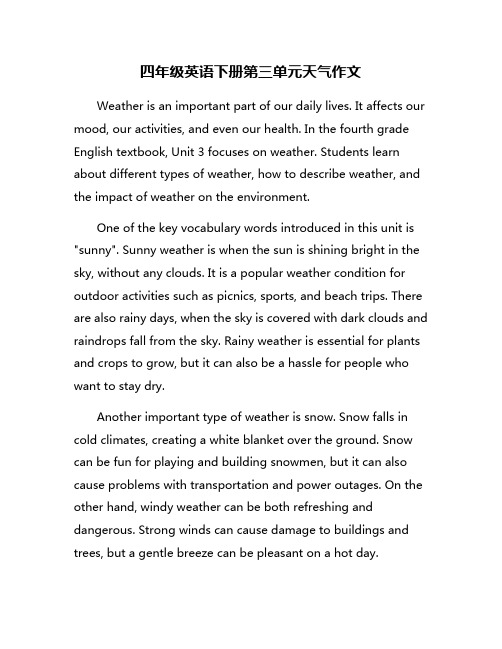
四年级英语下册第三单元天气作文Weather is an important part of our daily lives. It affects our mood, our activities, and even our health. In the fourth grade English textbook, Unit 3 focuses on weather. Students learn about different types of weather, how to describe weather, and the impact of weather on the environment.One of the key vocabulary words introduced in this unit is "sunny". Sunny weather is when the sun is shining bright in the sky, without any clouds. It is a popular weather condition for outdoor activities such as picnics, sports, and beach trips. There are also rainy days, when the sky is covered with dark clouds and raindrops fall from the sky. Rainy weather is essential for plants and crops to grow, but it can also be a hassle for people who want to stay dry.Another important type of weather is snow. Snow falls in cold climates, creating a white blanket over the ground. Snow can be fun for playing and building snowmen, but it can also cause problems with transportation and power outages. On the other hand, windy weather can be both refreshing and dangerous. Strong winds can cause damage to buildings and trees, but a gentle breeze can be pleasant on a hot day.Learning how to describe weather is an important skill for students. In this unit, students practice using adjectives to describe different types of weather. They learn phrases like "It's hot today", "It's cold and windy", and "It's raining cats and dogs". By using descriptive language, students can communicate effectively about the weather they are experiencing.In addition to learning about different types of weather, students also study the impact of weather on the environment. For example, they learn how climate change is causing more extreme weather events, such as hurricanes, droughts, and heatwaves. Students also learn about the importance of conserving energy and reducing carbon emissions to help mitigate the effects of climate change.Overall, Unit 3 of the fourth grade English textbook provides a comprehensive overview of weather. Students learn about different types of weather, how to describe weather, and the impact of weather on the environment. By understanding and appreciating the weather around us, students can become more informed and responsible global citizens.。
- 1、下载文档前请自行甄别文档内容的完整性,平台不提供额外的编辑、内容补充、找答案等附加服务。
- 2、"仅部分预览"的文档,不可在线预览部分如存在完整性等问题,可反馈申请退款(可完整预览的文档不适用该条件!)。
- 3、如文档侵犯您的权益,请联系客服反馈,我们会尽快为您处理(人工客服工作时间:9:00-18:30)。
•meteorology 气象学•atmosphere 大气
•elements 自然力量(风、雨)•frost 霜
•hail 雹
•haze 霾
•mist 薄雾
•fog 雾
•thunder 雷
•drizzle毛毛雨
•light rain 小雨
•moderate rain 中雨
•heavy rain 大雨
•shower阵雨
•thunder shower 雷阵雨•downpour倾盆大雨•rainstorm 暴风雨
•sleet冻雨,雨夹雪
•lightning 闪电
•cloudy,overcast 多云的,天阴的•sunny, clear 晴
•breeze 微风
•gale 大风
•gust of wind 阵风
•dew 露水
•humidity 潮湿
•freeze 冰冻
•snowflake 雪花
•snowfall 降雪
•snowslide 雪崩
•snowstorm 暴风雪
•dead calm 风平浪静
•Indian summer 小阳春•drought 干旱
•cool summer 凉夏
•mild winter暖冬
•mid-summer 仲夏
•mid-winter 仲冬
•drift ice流冰
•volcano火山
•smog 烟雾
•flood tide涨潮
•tidal wave潮波
•thunderbolt雷电
•cold wave寒潮
•hot wave热浪
•landslide山崩
•ground subsidence地表下沉
•air mass 气团
•front 锋
•Arctic Air mass 冰洋气团(北极气团)•polar Air mass 极地气团
•Continental polar极地大陆气团•Maritime polar cold and moist 极地海洋气团•tropical Air mass 热带气团
•Continental Tropical 热带大陆气团•Maritime tropical 热带海洋气团•cyclone 气旋
•typhoon 台风
•hurricane 飓风
•whirlwind旋风
•tornado龙卷风
•waterspout 水龙卷。
